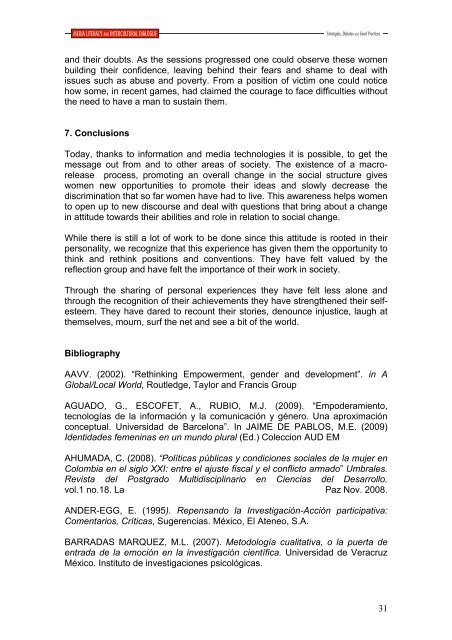Libro
Libro
Libro
Create successful ePaper yourself
Turn your PDF publications into a flip-book with our unique Google optimized e-Paper software.
MEDIA LITERACY AND INTERCULTURAL DIALOGUE<br />
Strategies, Debates and Good Practices<br />
<br />
and their doubts. As the sessions progressed one could observe these women<br />
building their confidence, leaving behind their fears and shame to deal with<br />
issues such as abuse and poverty. From a position of victim one could notice<br />
how some, in recent games, had claimed the courage to face difficulties without<br />
the need to have a man to sustain them.<br />
7. Conclusions<br />
Today, thanks to information and media technologies it is possible, to get the<br />
message out from and to other areas of society. The existence of a macrorelease<br />
process, promoting an overall change in the social structure gives<br />
women new opportunities to promote their ideas and slowly decrease the<br />
discrimination that so far women have had to live. This awareness helps women<br />
to open up to new discourse and deal with questions that bring about a change<br />
in attitude towards their abilities and role in relation to social change.<br />
While there is still a lot of work to be done since this attitude is rooted in their<br />
personality, we recognize that this experience has given them the opportunity to<br />
think and rethink positions and conventions. They have felt valued by the<br />
reflection group and have felt the importance of their work in society.<br />
Through the sharing of personal experiences they have felt less alone and<br />
through the recognition of their achievements they have strengthened their selfesteem.<br />
They have dared to recount their stories, denounce injustice, laugh at<br />
themselves, mourn, surf the net and see a bit of the world.<br />
Bibliography<br />
AAVV. (2002). “Rethinking Empowerment, gender and development”. in A<br />
Global/Local World, Routledge, Taylor and Francis Group<br />
AGUADO, G., ESCOFET, A., RUBIO, M.J. (2009). “Empoderamiento,<br />
tecnologías de la información y la comunicación y género. Una aproximación<br />
conceptual. Universidad de Barcelona”. In JAIME DE PABLOS, M.E. (2009)<br />
Identidades femeninas en un mundo plural (Ed.) Coleccion AUD EM<br />
AHUMADA, C. (2008). “Políticas públicas y condiciones sociales de la mujer en<br />
Colombia en el siglo XXI: entre el ajuste fiscal y el conflicto armado” Umbrales.<br />
Revista del Postgrado Multidisciplinario en Ciencias del Desarrollo.<br />
vol.1 no.18. La Paz Nov. 2008.<br />
ANDER-EGG, E. (1995). Repensando la Investigación-Acción participativa:<br />
Comentarios, Críticas, Sugerencias. México, El Ateneo, S.A.<br />
BARRADAS MARQUEZ, M.L. (2007). Metodología cualitativa, o la puerta de<br />
entrada de la emoción en la investigación científica. Universidad de Veracruz<br />
México. Instituto de investigaciones psicológicas.<br />
31



